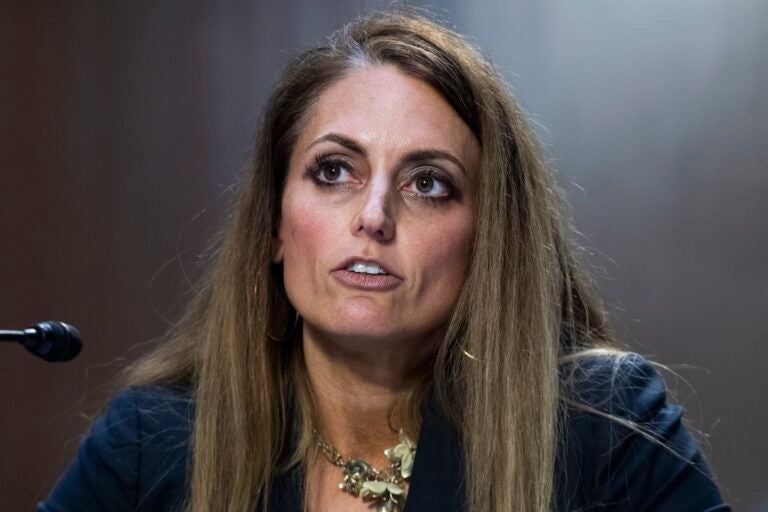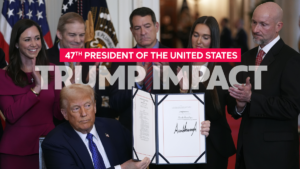Trump’s controversial pick will soon join federal 3rd Circuit Court of Appeals, which hears cases from Pa., N.J. and Del.
Jennifer Mascott may not have the same “baggage” as Emil Bove, but Democrats decry her lack of experience and area ties.
Listen 1:28
Jennifer Mascott testifies during a Senate Judiciary Committee hearing on Texas' abortion ban, in Washington, D.C., on Sept. 29, 2021. (Tom Williams/CQ Roll Call/POOL)
From Philly and the Pa. suburbs to South Jersey and Delaware, what would you like WHYY News to cover? Let us know!
The 3rd Circuit Court of Appeals — the federal appellate court with a jurisdiction that includes Pennsylvania, Delaware and New Jersey — is welcoming its latest member. Jennifer Mascott will hear cases that arise out of Delaware.
Confirmed in a narrow 50-47 U.S. Senate vote, Mascott becomes the latest Trump-aligned nominee to secure a lifetime seat on the federal appellate bench, further entrenching a conservative majority on one of the country’s most influential courts. Alaska Sen. Lisa Murkowski was the only Republican to vote against confirmation.
Her confirmation, delivered almost entirely along party lines, drew sharp criticism from Senate Democrats — particularly those from Delaware — who condemned the process as “norm-shattering” in ignoring long-standing judicial customs, saying she has “little — if any — connection to our state or to the 3rd Circuit.”
“Ms. Mascott has never been a member of the Delaware bar and was only admitted to practice before the Third Circuit two months ago,” Delaware’s Democratic U.S. Sens. Chris Coons and Lisa Blunt Rochester wrote in a shared statement. “Her key qualification appears to be that she works in President Trump’s White House Counsel’s Office. She has never been a judge of any kind, yet she is nominated to one of the highest judicial posts in the country.”
Who is Jennifer Mascott?
Mascott is a conservative legal scholar and former U.S. Department of Justice official with strong ties to Republican legal circles. Prior to law school, she worked in communications and legislative roles for GOP lawmakers, including Reps. Eric Cantor and Anne Northup. She earned her law degree from George Washington University in 2006, graduating summa cum laude and serving as a senior editor of the George Washington Law Review.
She clerked for then-Judge Brett Kavanaugh on the D.C. Circuit and later for Supreme Court Justice Clarence Thomas. As an academic, she taught at George Mason University’s Antonin Scalia Law School and more recently at Catholic University of America, publishing extensively on constitutional law, separation of powers and federal courts in prominent prestigious academic journals and case books.
Mascott has held senior roles in the Trump administration’s DOJ, serving as deputy assistant attorney general in the Office of Legal Counsel and later as associate deputy attorney general. She joined the White House Counsel’s Office in Trump’s second administration.
Professor Carl Tobias of the University of Richmond School of Law said that despite the criticism, her record meets many of the expectations for an appellate judge.
“She’s taught and written in the area of constitutional law,” he said. “She’s filed appeals in a number of federal courts, and I think she probably would be considered qualified by most people who understand the federal judiciary.”
However, Tobias and other legal scholars agree that her confirmation violates a tradition, which Sen. Coons of Delaware decried.
The end of blue slips?
Mascott was nominated by Trump to fill what is commonly known as the “Delaware seat,” a position traditionally held by jurists with strong ties to the First State. For decades, that seat has gone to nominees with deep connections to Delaware’s legal community. It was last held by Judge Kent Jordan, who served as assistant U.S. attorney for the District of Delaware. He retired in January.
A major point of friction was the departure from the Senate’s blue-slip practice, under which home-state senators could block judicial nominees.
“There’s a long tradition in Delaware and elsewhere that home-state senators are consulted by the White House before a nomination is made,” said Tobias. “Usually, people seriously considered are ones who have either been practicing lawyers or been judges in the state. That’s particularly important with Delaware because of its standing as the most important state for corporate law and its development in the United States.”
In that tradition, nominees to regional federal courts were subjected to “blue slips” — approvals from their home-state senators — to move forward. But Senate Republicans eliminated that courtesy for many appellate nominees during Trump’s first term. Mascott’s confirmation, and the concurrent advancement of 7th Circuit nominee Rebecca Taibleson without support from her home-state senator, reflects how that procedural guardrail has been dismantled.
Coons and Blunt Rochester vetted multiple potential nominees and submitted names to the White House — including two Trump-appointed district court judges — but their input was ignored. They said Mascott’s nomination reflected an erosion of the Senate’s advice and consent role in judicial nominations.
Mascott admitted during her confirmation process that she is not a Delaware resident, was not registered to vote there and has not practiced law before a Delaware court. Her only connection to Delaware is a beach house she and her family own — a fact Delaware’s senators and other critics repeatedly seized upon.
When questioned, Mascott said she would maintain her chambers in Wilmington if confirmed.
The blue-slip tradition, Tobias explained, is over a century old but has eroded sharply for appellate nominees. He traced the current state of affairs back to 2017, when Judiciary Chair Chuck Grassley created what became known as the “circuit exception,” allowing circuit court nominees to bypass home-state approval.
While the tradition is still largely upheld for district court judges and U.S. attorneys, Tobias said, the exception for appellate courts now appears entrenched.
“It’s dictated by whoever chairs the Judiciary Committee,” he said. “It’s so very partisan, politicized right now that I expect that there won’t be a change in the circuit exception” anytime soon.
Presidential immunity and abortion
During her Senate Judiciary Committee hearing, Mascott faced pointed questioning on both her experience and her legal views. Sen. Coons challenged her limited litigation background and lack of connection to Delaware.
“Your record of scholarship and public commentary advocacy is quite lengthy,” he said. “But your actual practice is quite short.”
Mascott responded that she had practiced in Virginia and would draw on that experience if confirmed.
California Sen. Adam Schiff asked about the president’s power and immunity, asking whether the president had the power to assassinate an American on U.S. soil, a question that originated during a hearing before the D.C. Court of Appeals, during which the administration was arguing for absolute immunity.
“Would the president be immune from prosecution if he ordered SEAL Team Six to assassinate a political opponent?” he asked.
Mascott declined to give a yes or no answer, saying the Supreme Court had not ruled on such a case and that “political mechanisms” might constrain such an extreme act. Schiff pressed her further, but Mascott continued to avoid taking a definitive stance.
She was also questioned about her prior writings supporting the outcome in Dobbs v. Jackson Women’s Health Organization, the 2022 decision that overturned Roe v. Wade. Before the ruling, Mascott had argued that the Due Process Clause “contains no substantive right.” Afterward, she praised the decision for “reclaiming [the Court’s] legitimate constitutional role.”
Republican support
Though viewed negatively by Democrats, Mascott’s nomination was strongly supported by Senate Republicans. Her supporters argued that her experience in constitutional law and service in two administrations made her well-prepared for the appellate bench.
A favorite of conservative legal circles, she’s frequently been called to testify by Senate Republicans on Supreme Court confirmations and judicial reform proposals and written extensively for libertarian organizations such as CATO.
Mascott’s nomination was strongly supported by Senate Republicans. Grassley called her “a trusted legal voice” and praised her previous appearances before the committee.
“We trusted her judgment then, and we can surely trust that judgment now,” he said. “She has had a very distinguished career as a public servant and has impeccable professional qualifications.”
He further noted that her work had been cited by the U.S. Supreme Court several times.
A court transformed, but maybe not radically
With Mascott’s ascension, the 3rd Circuit now has eight Republican-appointed judges out of 14, including six named by Trump. Her confirmation came just months after another Trump nominee, Emil Bove — a former DOJ official and Trump’s personal legal adviser — was confirmed to a separate seat.
However, while the ideological makeup of the court has shifted, Tobias cautioned against overreading its implications.
“It’s a crude measure to just count how many judges were appointed by Republican or Democratic presidents,” he said. “Some of Trump’s earlier appointees are actually quite moderate. And some of the Democratic appointees are not necessarily that liberal or progressive. So it’s a mix.”
Tobias also emphasized that the 3rd Circuit has a reputation for collegiality — unlike some other circuits known for ideological divides.
“There’s a long tradition of collegiality on that court,” he said. “They do seem to really strive to be collegial and work well with one another and not be disagreeable or pick sides. And so the court works well in that way, which is important to operating smoothly.”
Though Democrats remain frustrated — especially over the loss of the seat filled by Bove — Mascott’s arrival on the court appears less polarizing than her predecessor’s. That was demonstrated by Coons’ own warm comments toward her at the hearing.
“You’ve been a fierce, determined and capable professor,” Coons said at the end of his questioning. “I appreciate our conversation yesterday and your answers to my questions today.”
Tobias said that Bove’s confirmation may have been more repellant to Democrats because he had served as Trump’s personal lawyer. They were also likely frustrated by the fact Bove’s appointment was made possible by the fact it came months after Republicans managed to kill the confirmation of President Joe Biden’s own nominee Adeel Mangi just months earlier.
“[Mascott] doesn’t come with some of the baggage that Bove had,” said Tobias. “I think she’ll fit in well, and the court will continue to function. But we’ll have to see what issues arise from Bove’s appointment.”

Get daily updates from WHYY News!
WHYY is your source for fact-based, in-depth journalism and information. As a nonprofit organization, we rely on financial support from readers like you. Please give today.










